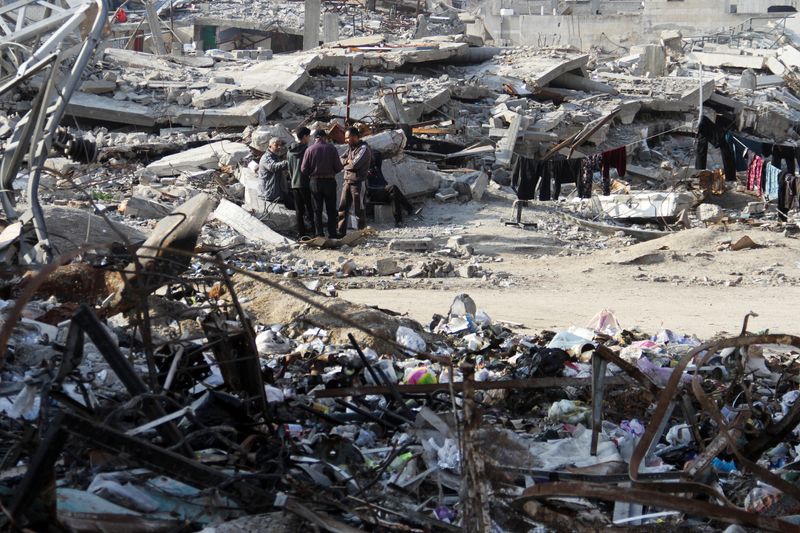
By Andrew Mills, Nidal al-Mughrabi and Maayan Lubell
DOHA/CAIRO/JERUSALEM (Reuters) – Israel stepped up strikes in Gaza hours after announcing a ceasefire and hostage release deal, residents and authorities in the Palestinian enclave said, and mediators sought to end the fighting in the ceasefire did not start on Sunday.
The complex ceasefire agreement between Israel and the militant group Hamas, which controls Gaza, emerged on Wednesday after months of mediation by Qatar, Egypt and the US and 15 months of bloodshed that has devastated the territory of coastal and warming the Middle East.
The agreement stipulates a six-week initial ceasefire with the gradual withdrawal of Israeli forces from the Gaza Strip, where tens of thousands have been killed. The hostages taken by Hamas will be released in exchange for Palestinian prisoners held by Israel.
At a news conference in Doha, Qatar’s Prime Minister Sheikh Mohammed bin Abdulrahman Al Thani said the ceasefire would take place on Sunday. Negotiators are working with Israel and Hamas on steps to implement the agreement, he said.
“This agreement will end the fighting in Gaza, advance much-needed humanitarian aid to Palestinian civilians, and reunite hostages with their families after more than 15 months of captivity,” the US President said. Joe Biden in Washington.
His successor, Donald Trump, took office on Monday and claimed credit for the collapse in Gaza.
Israel’s acceptance of the deal will not become official until it is approved by the country’s security cabinet and government, with votes scheduled for Thursday, an Israeli official said.
The deal is expected to win approval despite opposition from some hardliners in Prime Minister Benjamin Netanyahu’s coalition government.
While people celebrated the agreement in Gaza and Israel, the Israeli military stepped up attacks after the announcement, the civil emergency service and residents said.
Heavy Israeli bombardment, mainly in Gaza City, killed 32 people on Wednesday, medics said. The strikes continued early Thursday and destroyed homes in Rafah in southern Gaza, Nuseirat in central Gaza and in northern Gaza, residents said.
The Israeli military did not immediately comment and there were no reports of Hamas attacks in Israel after the cease-fire was announced.
A Palestinian official close to the truce negotiations said mediators are trying to persuade both sides to suspend hostilities before the truce takes effect.
JUBILATION IN GAZA
In posts on social media, some residents of Gaza urged Palestinians to be careful in the belief that Israel may increase its attacks in the next few days to increase the gains of the non the ceasefire will begin.
However, news of the cease-fire agreement sparked joy in Gaza, where Palestinians face severe shortages of food, water, shelter and fuel. In Khan Younis, crowds blocked the streets amid the sound of horns as they cheered, waved Palestinian flags and danced.
“I’m happy. Yes, I’m crying, but they’re tears of joy,” said Ghada, a missing mother of five.
In Tel Aviv, the families of the Israeli hostages and their friends also welcomed the news, saying in a statement that they felt “great joy and relief (about) the agreement to bring our loved ones at home.”
In a statement on social media announcing the ceasefire, Hamas called the agreement “a success for our people” and “a turning point.”
If successful, the ceasefire would end fighting that has destroyed much of urbanized Gaza, killed more than 46,000 people and displaced most of the small pre-war population of 2.3 million, according to Gaza authorities. .
That in turn will stoke tensions across the Middle East, where the war has fueled conflict in the Israeli-occupied West Bank, Lebanon, Syria, Yemen and Iraq, and raised fears of all-out war between the enemies of the region of Israel and Iran.
With 98 Israeli hostages remaining in Gaza, the first phase of the agreement included the release of 33 of them, including all women, children and men over 50. The first phase, a a source said.
FOOD LINES AT GAZA BORDERS
The agreement calls for an influx of humanitarian aid to Gaza, and the UN and the International Committee of the Red Cross say they are preparing to scale up their aid operations.
“A ceasefire is the beginning – not the end. We have food lined up on the borders of Gaza – and it must be brought to scale,” said Cindy McCain, executive director of the World Food Program, in X .
Global reaction to the ceasefire was enthusiastic. Leaders and officials in Egypt, Turkey, Britain, the United Nations, the European Union, Jordan, Germany and the United Arab Emirates, among others, celebrated the news.
Biden and Trump both claimed credit for the deal that was months in the making but was helped down the line by a Trump emissary.
Trump’s Mideast envoy Steve Witkoff is in Qatar with White House envoys for talks, and a senior Biden administration official said Witkoff’s presence was critical to reaching an agreement after 96 hours of intense negotiations.
Biden said the two teams “spoke as one”.
Hostage families in Israel have expressed concern that the agreement may not be fully implemented and some hostages may be left behind in Gaza.
Negotiations to implement the second phase of the agreement will begin on the 16th day of phase one, and this phase is expected to include the release of all remaining hostages, a permanent ceasefire and the full withdrawal of Israeli forces from Gaza.
The third stage is to resolve the return of all the remaining dead bodies and the start of the reconstruction of Gaza managed by Egypt, Qatar and the United Nations.

If all goes well, the Palestinians, Arab states and Israel still need to agree on a vision for post-war Gaza, including the unanswered question of who will run Gaza after the war.
Israeli troops stormed Gaza after Hamas-led militants attacked communities in Israel’s border-area on October 7, 2023, killing 1,200 soldiers and civilians and taking more than 250 hostages, according to in Israeli tallies.








